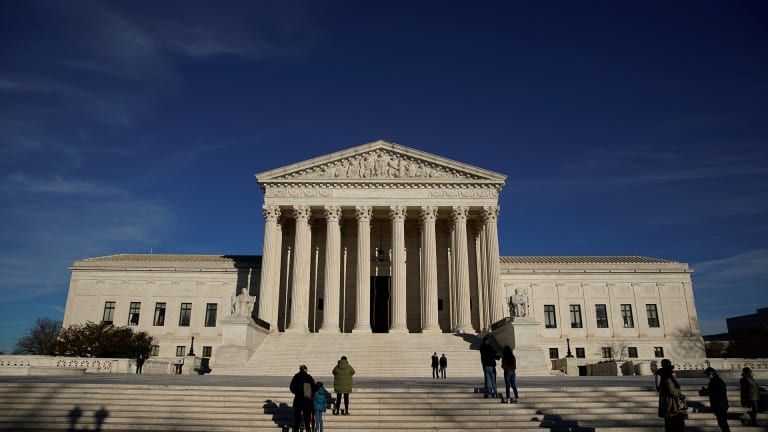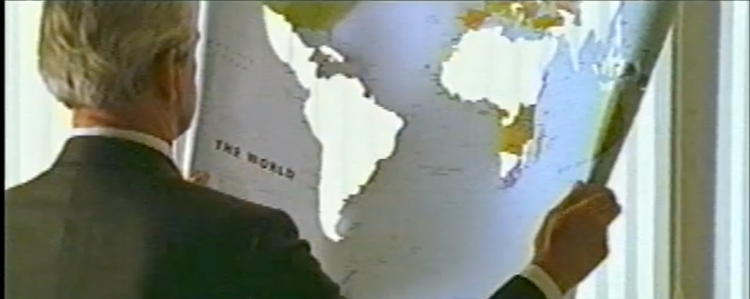Drilled Down: Even in the Worst-Case Scenario with West Virginia v EPA, We Still Have Pathways to Climate Action

I've been seeing a lot of hot takes online about what the West Virginia v EPA ruling might bring. In the worst-case scenario, it could overturn the Massachusetts v EPA precedent, which held that the EPA had the authority to regulate greenhouse gases. And because of that, a lot of folks are saying a bad ruling here would broadly and categorically revoke the EPA's authority to do so. That's an inaccurate read of this case. Although certainly one of the goals of the conservative judicial movement is to stop the government from ever doing anything about climate, make no mistake, they can't get all the way there via this case.
Even with its bizarre decision to hear this case, and then to use it as a vehicle for the "major questions doctrine," allowing the court to, in essence, draft an advisory opinion for the EPA—all of which is truly unheard of, but we know this court cares little for norms or precedent—it's still limited by the specifics of the original case, which relate to section 111D of the Clean Air Act, so also very specifically to power plants and their emissions.
"I think the worst case scenario here is that they cabin EPA's authority in a way that is going to make it more difficult for the Biden administration and future administrations to regulate effectively under section 111 of the Clean Air Act," Jason Rylander, an attorney with the Center for Biological Diversity, says. "The good news is the Clean Air Act is broader than that. And there are a lot of other ways that we can get at greenhouse gas."
Even within the Clean Air Act itself, for example, Section 115 requires EPA to regulate international air pollutants upon receipt of “reports, surveys or studies” from an international agency that indicate that air pollutants emitted in the U.S. could “reasonably be anticipated to endanger public health or welfare in a foreign country.” The IPCC reports and their increasingly urgent warnings would certainly seem to qualify. But if the worste happens here, it would seem like a fool's errand to look for other parts of the Clean Air Act that might work, given the likelihood of the Supreme Court knocking back those ideas as well. Instead, let's take a look at a few other options that remain viable no matter what happens in this case.
Particulate Matter
The EPA already regulates particulate matter and it moved earlier this year to tighten its regulations on this type of air pollution. Those updated regulations are being finalized right now. Guess what generates particulate matter, also known as soot? The combustion of fossil fuels, especially gasoline in cars and coal in power plants.
Guess how I know that particulate matter regulations are an effective curb on greenhouse gases? Because Steve Milloy, a guy so extreme he's still pushing old-school climate denial and is genuinely pissed that Exxon has given it up, has been warning the right for years that particulate matter regulations are just climate policy in disguise. That also means, of course, that they are a target. However the one thing the right has found it nearly impossible to spin over the past 50 years is that dirty air is actually good. Today they would be fighting that battle not just amidst a never-ending respiratory pandemic, but also a steady stream of articles and studies pointing to the millions of people around the world still dying early thanks to air pollution.
The Toxic Substances Control Act
As I covered recently, a petition was filed with the EPA earlier this month, asking the agency to make a determination about the risk greenhouse gases pose to human health and the environment, and then to commence rulemaking to mitigate that risk. Unlike the Clean Air Act, TSCA includes very explicit language about the authority it grants to the EPA.
"This sort of problem is exactly the thing TSCA was designed for," explains former EPA scientist Donn Viviani, one of the petitioners, along with climate scientist Dr. James Hansen, and climate accountability expert Richard Heede. "Congress knew that there were, there were problems out there that a single program couldn't handle and that we needed something more expansive. It was designed to take care of things that the other laws weren't properly taking care of. And if you look back at the history of climate, it's quite clear that none of the other laws are taking care of this. So this is exactly what TSCA is designed to do actually."
Viviani notes that TSCA has been used to deal with global warming in the past as well.
"TSCA actually was used in 1978 for just this purpose, with respect to CFCs on the ground. In the rule that CFCs were endangering the ozone layer and presented a serious risk with respect to global warming. CFCs are also a gas and therefore, you know, there actually is strong precedent in EPA's own actions and utilizing this statute to kickstart in effort to get rid of that potent pollutant that has very strong greenhouse gas forcing effective."
It also has the benefit of clear language around the EPA's authority, language that was strengthened with bi-partisan support in 2016.
"They just reauthorized the act in 2016. It was a bi-partisan reauthorization. So this language, that the TSCA is supposed to deal with unreasonable risk is recent and it was a bipartisan passage."
Dan Galpern, executive director and general counsel for the Climate Protection and Restoration Initiative, is the lawyer spearheading the TSCA petition, and he says the outcome of West Virginia v EPA shouldn't have any impact on this effort.
"111 D of the Clean Air Act has nothing to do with our petition under the Toxic Substances Control Act," he says. "111D of the clean air act confers authority on EPA to compel emissions controls from existing power plants. And there is a specific question as to whether the Obama EPA in fashioning the now dormant Clean Power Plan overstepped its bounds and read into provision of law authority to restrict emissions outside the fence line of power plants, rather than just inside the fence line of power plants. So that's a specific, fairly narrow technical issue. Those including West Virginia and a number of other conservative states and a portion of the fossil fuel industry are urging the Supreme court in that case to rule much more broadly to say that without express language in the statute, no federal agency can really do much to restrict economic activity at the center of industrial policy, within a sector of the economy. And so they're seeking to have a very broad prohibition against not only the EPA, but other agencies' attempts to restrict activity that even where it presents a significant risk to human health or the environment. I'm not saying it's impossible, we will see, but the language at issue in section 111 I think, while EPA did construe it correctly is far more vague or ambiguous than the language that we're relying on under the Toxic Substances Control Act in our petition. All that is to say that I think that even if the Supreme court rules very broadly in West Virginia versus EPA, the legal basis for our petition under the Toxic Substances Control Act should be unaffected."
More DPA Spending
In the absence of regulation, of course, stimulating the market for renewables is also a way to curb greenhouse gas emissions. Biden has already used the climate emergency as part of the justification to invoke the Defense Production Act, which he has used to juice U.S. manufacturing of solar panels and heat pumps, and to lift tariff on solar imports while that manufacturing ramps up over the next two years. In the face of a broad ruling here, massive spending, pulling on those economic levers in the short term, is critical.
Legislation
What the court might be trying to force with a broad West Virginia v EPA ruling is the necessity for Congress to pass legislation if it wants to regulate greenhouse gas emissions. Congress should absolutely do that, but the Senate has been a major obstacle to that process for decades. While I think the criticism of Democrats for urging everyone to vote more as we get pummeled by terrible SCOTUS decision after terrible SCOTUS decision (and hey, I've leveled criticism of that strategy too), it's a fact that a super majority in the government would provide one avenue to passing climate legislation and getting out of the whole "are regulatory agencies even Constitutional" track that the Supreme Court is currently on.
Abolish the Filibuster, Codify Emissions Regulations, Pack the Court
As with the Roe decision, one way to potentially get around the Congressional gridlock on climate is to abolish the filibuster, codify emissions regulations, and pack the court (and hell, pass a law blocking further court-packing if need be). It seems incredibly unlikely that Biden would ever go this route, he just doesn't have the temperament for it, but... desperate times, so who knows.
Litigation
There are more than 1800 cases currently underway worldwide, all targeting fossil fuel companies and their role in the climate crisis. These cases will continue irrespective of what happens in West Virginia v EPA, and many of them are happening outside the U.S. so the Bizarro turn of our Supreme Court matters not. Some are seeking to force emissions reductions, others are seeking damages, and still others seek to force governments to regulate the industry more tightly.
State and Local Government
The Public Utilities Commission in every state has explicit and broad authority to regulate energy production in that state, and are a prime target in the wake of a broad ruling here. States can offer both incentives for transition, regulations on emissions, and bans on things like gas in new buildings (which several states are already doing; of course a nearly equal number have passed preemptive bans on bans, sigh).
Monetary Policy
Aaron Regunberg points out that there is one government entity that is all but immune to meddling from SCOTUS: The Federal Reserve. As the United States' central bank, the Fed is tasked with effectively promoting "the goals of maximum employment, stable prices, and moderate long-term interest rates.” Hard to imagine how any of that happens amidst complete climate breakdown. "A Fed climate agenda would focus on disrupting the market forces that brought the planet here in the first place," Regunberg wrote in a recent post for Balls and Strikes. When it loans U.S. financial institutions money to secure their deposits, for example, Regunberg notes that "the Fed could choose to provide a more favorable discount rate for green collateral, like clean energy assets, and a less favorable rate for fossil fuel-related collateral, like oil and gas investments. It could even go a step further and make fossil fuel collateral ineligible for assistance, placing an immense amount of pressure on financial institutions to drop these climate change-exacerbating assets." The Fed can also purchase green bonds (which other central banks around the world are already doing), and it could use its ability to purchase private debt to channel resources toward private-sector decarbonization efforts.
Revolution Anyone?
None of this is to say that the West Virginia v EPA case isn't a big deal, or that anxiety over what a ruling here might do isn't absolutely warranted. It is important to understand what might come down to this particular ruling, though, versus broader longterm obstacles to climate policy. Correct me if I'm wrong but... we haven't exactly been killing it on that front long before the West Virginia case came along. What it might do is provide the proverbial straw breaking the camel's back around the potential of regulatory agencies to do anything here. Some progressives are starting to talk more about what solutions outside of our current system look like. I talked to Max Berger, one of the cofounders of Momentum, the movement incubator that helped launch Sunrise, about this earlier this year and he had some interesting thoughts. Specifically:
If you just were to step back and look at the U S as a country, it would be very clear, you know, the current constitutional arrangement is not long for this world.
You know, you have a significant subset of the population, particularly the white population, although not only that, really terrified about the transition away from a white majority population to a multi-racial majority. And that's happening in the context of, you know, world historic inequality.
So you really do have the conditions for an ethno nationalist, authoritarian politics. Like call it fascist, call it ethno nationalist, authoritarian, call it white supremacist, a politics in which there is a significant number of people that are willing to use violence and do not really subscribe to the beliefs that are required of participating in a democracy because they're afraid of losing power within that democracy to other ethnic groups. And if you take that, you know, as a kind of skeleton key for what's going on, a lot becomes more clear in that, you know, that group of people that kind of white supremacist plurality is not big enough to govern the country, but it is big enough to take over the Republican party, as Trump showed. And through their control of the Republican party are able to take control of state and federal governments because we have a very anti-democratic political system.
And so that white supremacist plurality can take over the federal government and state governments with a minority of votes. And, you know, because of other anti-democratic aspects of our political system—the Senate, as we're seeing now, the electoral college, we are kind of threatened with every four years that there's going to be another instance in which the winner of the popular vote does not become president. And, you know, that has happened recently a number of times and the two party system, which allows for that, let's say 25 to 40% of the population to govern, we're not going to see the multiracial majority, um, have an opportunity to turn its will into law in the next 10 to 15 years. I think the amount of tension that will generate will break the political system.
Particularly when the people in power are taking active steps to move us away from competitive elections and limit people's rights. I cannot imagine a situation in which the multiracial majority takes that lying down. And I also don't think that the white nationalist plurality is going to become less vociferous in their opposition to a multiracial democracy.
So, you know, if you were to talk about this with comparative political scientists, they would tell you, if you have this kind of demographic transition happening, our political system is basically designed as poorly as possible to manage that kind of a demographic transition because the two party system collapses all divisions in society into a zero sum, all or nothing, competitive existential conflict.
And when that gets racialized or ethnicized, it can become dangerous very quickly. And in addition, you know, with the separately elected presidency and a bicameral system, we have what political scientists refer to as a profusion of veto points.
Right? So it's very, very difficult for bills to become law. There's a stat that I think does not bode well: the United States is the only system that has a separately elected executive branch that has not at some point collapsed into dictatorship. Because in presidential systems systems with the separately elected executive, what happens is there's a conflict between the president and the Congress. And there's some external crisis that requires action and their Congress is incapable of or unwilling to respond. And then the executive takes the authority to do so without the approval of the legislature. And once that is broken, it's very hard to take back. I think some version of that is more or less inevitable in the next five years. So the way I say it is like, look, we're going to get a new political system. The question is, does it happen before authoritarianism and civil war or after?
And I would love for it to be before, you know, as an American, I would love to not have to experience those things. So we're either looking at a post dictatorship, post-conflict situation or at how do we organize a political revolution before that happens?
Food for thought. And of course I'll be watching for the ruling and unpacking when it comes as well. We also put out a bonus episode on this case that gets into the long road here, and the role of the Republican Attorneys General Association, both in this case in particular and more broadly in the rightwing judicial push, so check that out.





